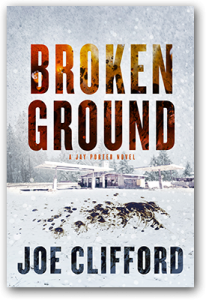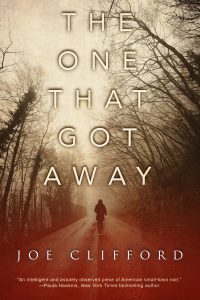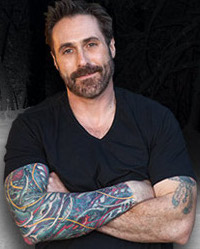Frank Reardon: Let’s dig right in! The first book I knew the name Joe Clifford was through your book Junkie Love. How did the book come together? Was it your first serious attempt into novel writing, besides the failures? I looked on the Amazon Page for the book and noticed the blurbs, is that the real Ravi Shankar? How does it feel to revisit that book? That era of your life? Is it painful? Or have you gained wisdom from it?
Joe Clifford: Holy fuck, man! That is A LOT of questions out of the gate! Let me take these one by one. How did Junkie Love come together? By being a fuckhead for ten years? Junkie Love is my memoir. I mean, you can call it autobiography or whatever. It was originally released as a novel. Second edition comes out this September as a memoir. But it’s a true story. So, yeah, I did a lot of drugs, stopped doing a lot of drugs, wrote a book about doing a lot of drugs. And, y’know, growing up. That’s really what the book is about: growing up. Was it my first serious attempt? Sorta? I mean, I’ve been making art since I could hold a pencil. Drawing, writing, painting, playing music. I can say this is the first effort that stuck.
Ravi Shankar! Ha! I just had dinner with Ravi at a writers’ colony the other night. Ravi Shankar is basically like “John Smith” in India. It is a very common name. That said, Ravi is making his own name certainly, a literary giant in the poetry world. More important, at least to me, Ravi along with all my other professors at Central Connecticut State when I first got off the street, helped keep me alive.
I just had a speaking engagement, a reading thing-y today, and yeah, I was talking about Junkie Love. Yesterday I was playing golf at the country club. Today I was talking about injecting mouse shit. It’s a weird juxtaposition, for sure. I was a different person then. Don’t get me wrong. I love that book. It is the most personal thing I’ve ever written, and the last thing I would do is disavow it; it will always be special. The best fan mail I ever get is from addicts, ex-addicts, who say my book resonated and made a difference. That is really cool, to know I did something good, that something positive came from that crazy time. That said, I am SO not that guy anymore. Painful? The parts about my mother and brother, who have both since died, are probably the hardest to revisit.
FR: Growing as a writer we all have some authors that are important to us. They spark. They get the juices flowing. They teach us. Who are five writers that sparked you from New England to Northern California? Who are a few authors you think people should be reading that people are not paying attention to?
JC: Five writers that sparked me?
- J.D Salinger
- Jack Kerouac
- Kurt Vonnegut
- Raymond Chandler
- Somerset Maugham
Reading now/authors who deserve your attention?
- Mary Kubica
- Jennifer Hillier
- Shannon Kirk
- Emily Carpenter
- Wendy Walker
FR: We’ve had a few conversations over the last couple years, whether about publishing, the Patriots, and so on. You had told me a story about switching agents or trying to switch. What’s been your experience with agents and publishers? To me it seemed like the hardest thing to do would be publishing, but now that I’ve started to publish my own short fiction I’ve noticed the hardest thing to do is find readers. What’s the rub between finding readers and working with agents and/or publishing houses?
JC: No, I have not felt any pressure from the publishing industry to address Trump or politics. If anything, I think the industry is probably leery of the subject. But, yeah, I have been going through … stuff. I left my agency last year, not for anything I wasn’t getting from the relationship (I loved my agent; she was one of my best friends). It was more… I had to do something. I don’t know, man. I’m just going through shit. A lot of that was my brother (and best friend) dying, an event complicated by his use of drugs and alcohol. Just life, y’know?
The toughest part of publishing is probably . . . you (universal). The industry is what it is, and agents and editors and publishers want to be wowed. It’s not like someone enters the field hating writing. As a writer, you don’t set out to write anything other than that most kick-ass, amazing book you can. So it, of course, stands to reason that, after busting your balls, bleeding out your heart, spilling your soul on the page, having someone say, “This isn’t right for us” is going to hurt. I don’t know any writer who hasn’t had that crisis of faith and didn’t want to say, “Fuck it.” Problem is, no one would give a shit.
It’s the Dennis Lehane note he keeps in his wallet: no one cares. If Stephen King or Lehane packed it up, sure, there would be a few hearts broken. But the average writer? No, man, it’s up to us to keep plowing on. There are a lot of writers. And not that many slots. Getting published isn’t that hard. If that is your goal, you can probably make it happen. Eventually. If your goal to is be bigger have more (and most writers need that validation), then, yeah, you’re bound to be disappointed. But if that is your life philosophy (bigger, more), you’re bound to be disappointed.
FR: Let’s get into Jay Porter. I love the character. I adore the new novel due out in June (Broken Ground). It was one hell of a ride. Being from New England myself I feel the scenery. You have a way with painting New Hampshire. I feel like I’m back there. Who is Jay Porter? Is he part you? Is he based on someone you know? Or maybe a mix of people? How did Jay come to you?
JC: I like to say Jay Porter is me, but I am not Jay Porter. I think that’s it. Jay is a conflicted character. He began life as my half-brother Jay Streeter, also a “rag and bone man” from the cold New England mountains. As I continued writing the character, learning about him, I realized Jay was more me, but the me before I grew up. That is if I ever grew up (feel free to ask my ex-wives). I haven’t hidden my addicted past, and part of that, addiction, involves a great deal of hardheaded immaturity. A lot of Jay’s ideas and attitudes are from a guy who… almost… gets it. What complicates matter for Jay is he is still smarter than most of the people in his tiny town but lacking this maturity he compounds problems. There’s something to be said for simplicity. Jay is not simple. There’s a line in the final Porter (#5 Rag and Bone) that sums this up nicely. Something like, “My moral compass, so stringent and unwavering, as usual was off.” I feel like that is Jay. He is stubborn and adheres rigidly to a moral code. But unlike someone like, say, Marlowe, Jay’s belief system isn’t as honorable. To me that makes him more real (not that I am knocking Chandler!). I just mean I’ve known a lot of guys like Jay. I was a lot like Jay. Most people in this world think they are right. How many times do you really have an argument in this life where the other person is like, “Wow. You really changed my mind”? No, it’s usually “Fuck you, dick. I’ll do it my way.” We are a hardheaded lot.
FR: Switching from memoir to crime fiction, how was that? Had you always been a fan of crime fiction? What’s your writing ritual like? Does it always have to be in the same place? I ask because I saw a picture of you dressed how you imagine Porter is dressed, is that how you always approach writing?
JC: Certainly I’ve read a lot of crime, thrillers, noir. I’ve read a lot of literary novels too. If forced to put my work in a category (and of course I have to) I’d say I write “literary thrillers,” sorta Russell Banks meets Lehane and Girl on the Train? Something like that. I strive to write an accessible prose. Books for people who don’t necessarily love to read? I love mainstream, psychological thrillers, Gone Girl, Girl on the Train, the works of Mary Kubica, Emily Carpenter, Jennifer Hillier, Shannon Kirk, Eileen Cook, Wendy Walker, et al. I was raised on Thompson and Chandler. Even more so Kerouac and Catcher in the Rye.
Being a former lowlife criminal junkie, I think my path was set! After the junkie memoir, what else was I going to write about? My writing ritual? I don’t know. Coffee and a computer? I’ve grown less particular. But if you mean the goofy props, yeah, I actually will adopt some of Jay’s dress. A wool cap indoors, and fake cigarettes hanging out of my mouth, small-batch IPAs, and I don’t defend this as anything other than, yeah, goofy writer shit. But I do find it helps me get in character, and if it looks weird to the outside world, who cares? It helps me feel like Jay. Of course I don’t have to share all this shit on social media, but I find the community overall to be enjoyable. Writing is a solitary act, and when you are going on eight hours and you’re dressing up like your character and talking to dead people, you feel like you are losing it. It’s nice to pop in on social media to remember, sure, you are unique. Just like everyone else.
FR: Porter is always in the shit with the Lombardis. It’s sort of funny, I grew up north of Boston, and one of my real good friends was named Jay Lombardi. It makes me laugh. Who are the Lombardis? What/who do they represent to you as the author?
JC: The Lombardis are based on the real-life Manafort Brothers (yes, those Manaforts). Paul and Frank Manafort, Michael and Adam Lombardi. One brother in politics, the other in construction. My father worked for the Manafort Brothers. They sent him to die at a contaminated construction site (you can Google it: Neil Clifford and Contamination Concerns). Early 2000s. Knew it was poisoned, placed profit over safety, and he died. Myleofibrosis. That’s the short of it. The Manaforts are (spoiler alert) assholes. The Porter books explore this, of course, much deeper.
FR: Let’s get back into the scenery. Jay’s friends, his wife etc. Did you spend some time in real life with these characters? Why Northern New Hampshire? I’m trying not to question it. I think we need more stories about Coos County. I wonder if the place holds a memory for you?
JC: Like most fiction, the setting is based on real life. Coos County is the Brattleboro Retreat in Vermont, where I spent a lot of time in rehab. Fictionalized of course (Brattleboro was instrumental in my getting straight, great people). The town of Ashton is actually my hometown of Berlin, CT, at least in terms of its geography, street names, high school, town Dairy Queen. I moved the setting to the New Hampshire mountains because, 1.) that is where my half-brother Jay actually worked, but 2.) more importantly I wanted a cut-off, closed-off inhospitable unforgiving terrain/cold. There is an actual Lamentation Mountain range in Connecticut. We went hiking there a lot in high school. Silver Lake, Paper Goods Pond, all real places in Berlin, CT.
FR: On your Facebook page I noticed how you just finished the final book Rag and Bone. That’s five books in the series. A long haul getting into the mind of a fictional human. How does it feel to part ways with Jay Porter? What has he taught you, if anything? What do you hope for Jay once you leave him to exist in his own fictional world for eternity?
JC: First off, my hope is always that this one sells so well that Oceanview (my publisher) throws gobs of money at me to write a sixth book! But assuming this is it, yeah, it’s weird saying goodbye. I feel like I’ve honored the arc and been true to who Jay is, while still trying to write an entertaining, compelling narrative. It has been a long trip, for sure. And honestly Jay Porter is not the greatest skin to occupy. He has lot of my characteristics, but they are exaggerated. So the anger, the depression, the cynicism, even the humor, is magnified, contorted, stretched to breaking points. Which can be, well, uncomfortable. I do have to remind myself, often, that my life isn’t as bad as Jay’s. But when you spend so much time in someone else’s skin, it’s hard to remember that sometimes.
FR: I noticed you signed a book deal for several new books with a new publisher. What’s the future hold for that? Tell us about the new publisher and the books.

JC: Yup. Down and Out Books. LOVE them! Have admired Eric Campbell and company from afar for a while. They are another indie, like Oceanview. Of course, as a writer, you want the biggest, best, most. Or maybe that’s just me. Who doesn’t want the six-figure advance from a Big Five? Well, that depends. The money would, obviously, be great. But there are a lot of perks working with a smaller house. And when I say smaller, I don’t want to shortchange D&O’s incredible accomplishments. Like last year, this year’s Anthony Award nominations feature a lot of Down and Out titles. But it’s all about the book and the fit and the vision publishers and authors share. I think it’s safe to say Eric, Lance, and I are all on the same page with these new stand-alones. At least if the cover for The One That Got Away (December 2018) is any indication! Fucking nailed it.
FR: Where do you see Joe Clifford the writer five to ten years from now? Still writing crime fiction? Or maybe another memoir? Maybe something completely new?
JC: The first answer that came to mind was “dead,” but people would probably read that as morbid even though I only meant it logically. Based on family history, 47 is borrowed time! Probably psychological thrillers? So, yeah, new direction. NYT best-selling psychological thrillers. And golfing a lot. I want to get my handicap into single digits.
FR: Bonus Question: We are both massive Patriots fans. We both know never to question Coach Belichick, but how do you feel about him benching Butler in the Super Bowl?
JC: This one is so tough. I’ve heard the rumors that Butler was benched for getting caught with weed and missing curfew. Who knows? Sure, a coach has to punish the player to maintain order. But why punish the fan? And if Butler starts that game, we win. Whatever. Sports, like life, will only break your heart.
